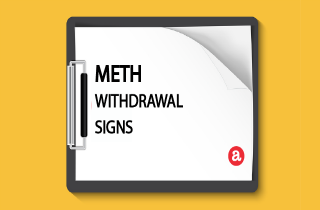Treatment for meth dependence and withdrawal is possible. People do recover and learn to live drug-free. Treatments during meth withdrawal include supportive medical interventions during acute detoxification. Furthermore, ongoing psychiatric care with antidepressant therapy has been shown to be effective in early recovery. But in order to stay off meth, issues that need to be addressed in treatment settings include modifying thinking, expectations, and behavior to increase skills in coping with life.
But are the signs that manifest during acute meth withdrawal? And how are these treated in order to have better chances at a longer term recovery? We review what meth withdrawal is like here. Then, we invite your questions or concerns in the comments section at the end.
Signs of meth withdrawal
Signs develop within a few hours to several days after cessation of or reduction in heavy and prolonged use of meth. In most cases it takes between 24-48 hours for the drug to process through a person’s system after the last dose is taken.
While meth withdrawal symptoms can be very intense, they are generally psychological in nature. Withdrawal requires several days of rest and recuperation. Evidence of weight loss may be juxtaposed with a marked increase in appetite and rapid weight gain. Depressive signs may last several days to weeks and may be accompanied by suicidal ideation and feelings of hopelessness.
Meth withdrawal signs may include:
- anhedonia (loss of interest or joy in life)
- confusion
- difficulty in concentration
- drug craving
- feeling paranoid
- hearing voices
- hunger
- jaw clenching
- memory loss
- night sweats
- sleepiness
- teeth grinding
- vivid and unpleasant dreams
First signs of meth withdrawal
Some of the early signs of meth withdrawal are:
- “crashing”
- fatigue
- increased appetite
- insomnia or hypersomnia
- intense and unpleasant feelings of lassitude and depression
- psychomotor retardation or agitation
Early signs of meth withdrawal
One of the hardest parts of meth withdrawal is what’s called “the crash.” Emotionally, it’s characterized by a very dark mood. Crashing after meth is like depression characterized by sadness and hopelessness, on the one hand, and rising anxiety or panic, on the other. Most likely, you haven’t slept in many days. Most likely, you haven’t been eating or hydrating properly, so it’s no surprise your body craves rest and nutrition.
Late signs of meth withdrawal
A meth addict going through the withdrawal process will experience symptoms of anxiety, agitation, sleeplessness, and intense cravings for the drug. Withdrawal symptoms can be addressed through the use of various vitamins, talk therapy, rest, daily exercise, and a healthy nutritional program. While the actual symptoms associated with acute withdrawal usually subside within about a week, or so, the addict will still experience periods of emotional upheaval and cravings for the drug LONG AFTER their last use.
Signs and symptoms of meth withdrawal treatment
Methamphetamine withdrawal causes you to have very low energy, depression, a lack of motivation, and eat more than usual. While there are currently no pharmacological treatments for dependence on methamphetamine, you can withdraw from meth safely with medical supervision. Currently, the most effective treatments for methamphetamine dependence is cognitive behavioral interventions. These approaches are designed to:
- help modify thinking
- help address expectancies
- teach behaviors and to increase
- skills in coping with various life stressors
Methamphetamine recovery support groups also appear to be effective supplements to behavioral interventions that can lead to long-term drug-free recovery.
Still, the best way to address signs of withdrawal is to receive medical help during detox. Doctors recommend that you check in to a drug detox center as you rid your body of meth and related toxins to help you stay safe and comfortable. Additionally, Antidepressant medications are helpful in treating depressive symptoms frequently
seen in methamphetamine users who recently have become abstinent.
Signals of meth withdrawal
Are you ready to get off meth? Please leave us your questions or comments in the section below. We’ll try to respond to you personally and promptly, or refer you to help.









Related Posts